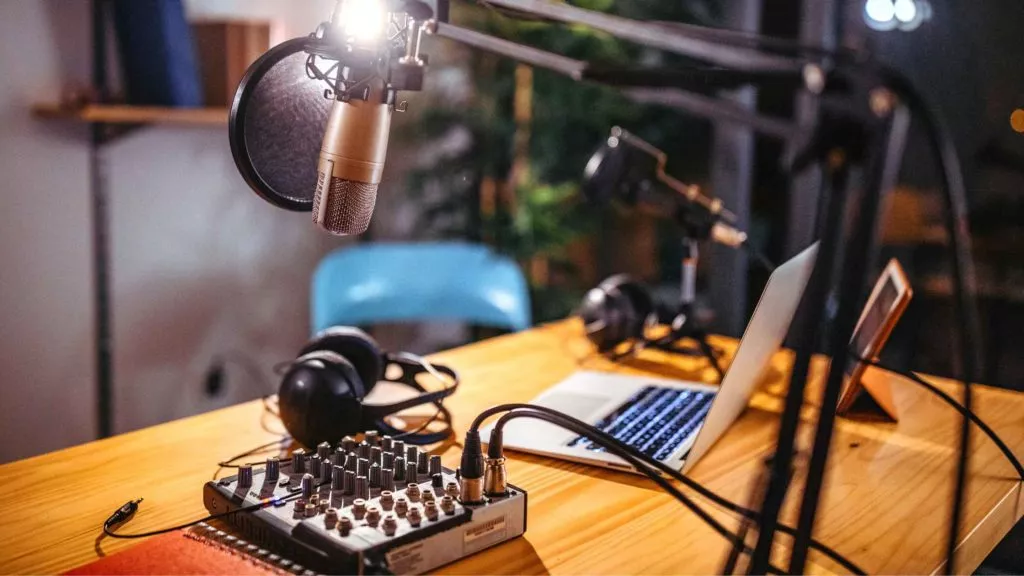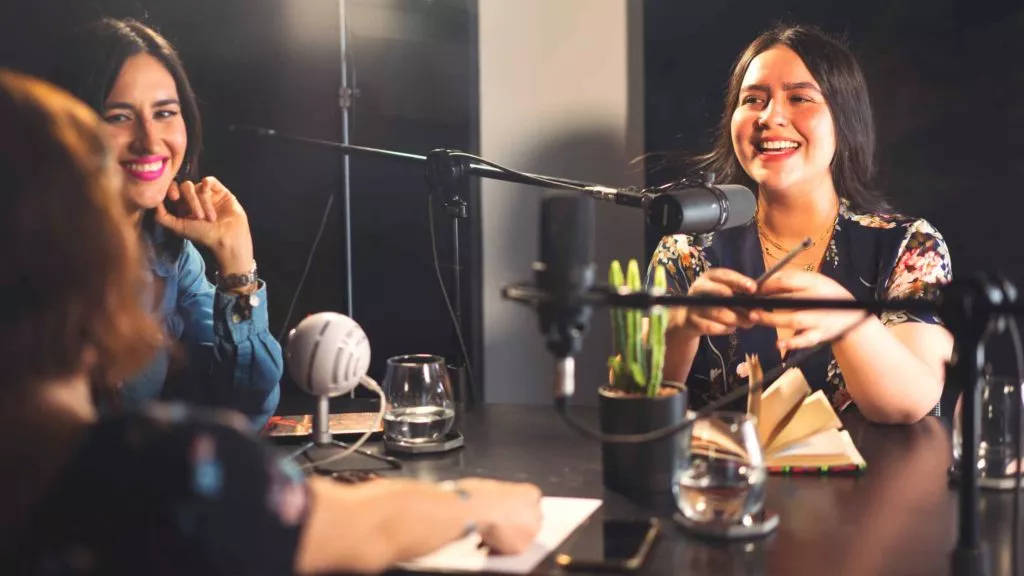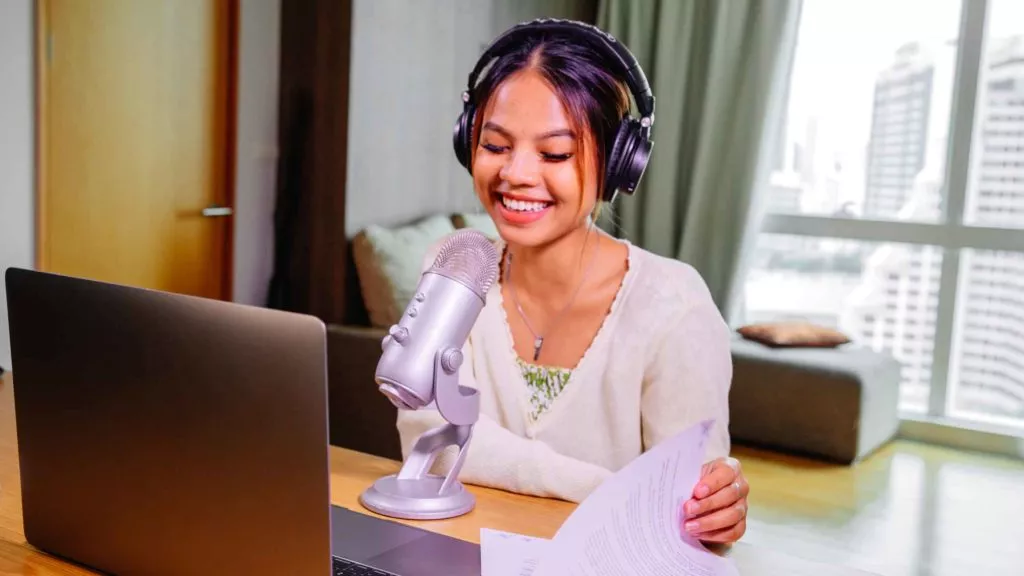The United States has the largest podcast market in the world. Over 117.8 million Americans listen to podcasts monthly, equating to 40% of all internet users. Considering how outrageously high these statistics are, it is unsurprising how podcasts integrate into daily modern American life.
Most people noticed the surge of podcasts during the early 2000s when the so-called Audible Revolution started, but its origin is traceable back to the 1980s. Back then, web bloggers attached recordings of their posts which listeners could access through MP3 players and other similar devices. This concept of convenient listening evolved through time and became the podcast setup that people know and love.
Average Americans listen to 44 minutes worth of podcast content per day. Podcasts went beyond being a mere source of audio entertainment at this point. Considering how intertwined podcasting is in people's lives, listening to podcasts has evolved into a new lifestyle.
Despite studies and estimates, there is no absolute way to tell how much podcasts affect the lives of Americans. Every podcast episode holds so much potential to draw people in and disseminate specific information. Whether you are a casual listener or an avid fan, it is crucial to learn the concept of a podcast and its impact on the different aspects of life.

What is a podcast?
The term "podcast" originates from two words, iPod and broadcast. Records show that the term's first usage is attributable to Ben Hammersley, a renowned columnist for newspaper and TV. Hammersley first mentioned "podcast" on February 2004 in his article for The Guardian and replaced the namesake "audio blogs" since then.
So, what is a podcast? Technically, it refers to a series of recorded audio episodes where people talk about anything. Most podcast productions follow specific themes and subjects to keep the conversations organized and consistent.
Americans are highly familiar with podcasts. Statistics show that at least 78% of the national population knows what podcasting means.
What is the purpose of a podcast?
Podcasts hold specific meanings to some people. Here are some of the biggest reasons why a person could have a special meaning to another:
Entertainment
One of the biggest reasons podcast websites, radio stations, and other similar institutions exist is that people seek entertainment. It is one of the easiest ways to amuse oneself because you can play the digital audio file in the background while doing other things. Besides, podcasts are accessible as you can listen to an entire podcast through any computer or mobile device.
Information dissemination
Podcasting is a critical tool for educating and influencing people. After listening for a while, audience members will eventually develop trust and adoration for the podcasters. As the level of trust and adoration increases, podcast listeners become more likely to believe the things the podcasters would share in every new episode.
Marketing
In connection to having a loyal following, many podcasts utilize their media content to sell something to their subscribed users. After all, podcasting is an active and effective stream of income. The most common way to do this is when podcasts mention sponsors during breaks and other key program segments.
Establish brand awareness
Raising brand awareness may also fall under marketing, but it is not as aggressive. Sometimes, brands utilize podcasts to let those who listen know that they have a company that serves a specific purpose. Besides promoting a corporate profile, podcasts also become an avenue to increase interactions in a hosting platform, like social media.
What are examples of popular podcasts?
Podcasts are today's equivalent of popular TV and radio shows. Because of the traction that podcasts receive and cause, many award-giving bodies recognize the impact of podcasts on the industry.
At time point, it is almost impossible to gauge the most popular podcasts in existence. However, an exceptional number of people consider the following their favorite podcasts:
The Joe Rogan Experience
Primarily hosted by American comedian Joe Rogan, the Joe Rogan Experience is a long-form and freestyle podcast not limited to a particular topic. This podcast hops from one hot issue to another, such as politics, entertainment, and sports. Over the years, this podcast has invited controversial figures such as Elon Musk, Senator Bernie Sanders, and Kevin Hart.
Statistics show that this podcast's audience is a mixed bag. On average, this podcast series attracts 11 million listeners per episode. A closer inspection of the numbers would reveal that its listeners are predominantly male, caucasian, and have a conservative or rightist political tendency.
Crime Junkie
Crime Junkie is a true crime podcast by life-long best friends Ashley Flowers and Brit Prawat. They talk about real crimes, such as murder and serial killing, and the mysterious disappearances of some people. The duo started their podcast in 2017 and have grown into internet superstars as time passed.
Estimates show that the average listener counter per Crime Junkie episode is 10 million. Flowers and Prawat believe that what makes their podcast popular is their ability to connect and empathize with the audience. In addition, they raised funds for causes relevant to their genre and helped facilitate justice in a few criminal cases.
Call Her Daddy
Call Her Daddy is a comedy podcast created by Alexandra Cooper and Sofia Franklyn in 2018. However, due to a conflict with Barstool Sports in 2021, Cooper now runs as the sole host of the podcast. Cooper continues to provide hysterical, hilarious, but realistic advice to their audience, who seeks counsel on topics such as love and sex.
Call Her Daddy is also among the podcast A-listers, with an average of 5 million listener count per episode. Most of the podcast's audience members are young adult females. This result is not surprising as the podcast primarily delves into topics like women's rights, sex positivity, and mental health.
My Favorite Murder
My Favorite Murder is a podcast hosted by two comedians, Karen Kilgariff and Georgia Hardstark. They first started airing this weekly show on January 2016. Over the years, the podcast continues to gain support from loyal fans and consistently ranks with the iTunes' Top 10 Comedy Podcast chart.
In every episode, Kilgariff and Hardstark will choose a murder-related story and recount the tales based on available records. In addition, they provide individual commentaries on the chosen topic, which make the conversation intriguing and entertaining. But besides being funny, the duo inserts their personal experiences and connects with the audience on a deeper level.
The Ben Shapiro Show
The Ben Shapiro Show is a production under The Daily Wire. It is hosted by Benjamin "Ben" Shapiro, a columnist and political commentator. The show runs on Mondays through Fridays, with Shapiro talking about political events and their implications for American society.
Besides news on politics and current events, Shapiro talks with figureheads to talk about conservative politics. They debate on thought-provoking topics that keep the audience interested and highly involved with American politics. With all of The Daily Wire's podcasts topping the Podtrac rankings, the Ben Shapiro Show is the largest and the one with the most active online traction.

What are the different types of podcasts?
As of 2022, there are more than 2.4 million podcasts worldwide. Like other media, podcasts also come in different types. Each type is unique and could offer a unique experience to listeners. Before diving into a podcast episode, try checking its format. You might enjoy its content more when you know what to expect.
Conversational podcasts
Conversation podcast is likely the most common and visible format across all digital platforms today. It is a straightforward setup where an individual or group opens up a conversation on a particular topic and freestyle into pouring their thoughts. It is a popular take on podcasting because it is akin to listening to a friend expressing their opinions on specific matters.
Note that under this format, the speakers are co-hosts. Although a person may lead the conversation at a given time, both share the responsibility of carrying the topic throughout the episode. The success of conversation podcasts largely relies on the chemistry of the people in the conversation.
Examples: Fresh Air With Terry Gross and The Combat Jack Show
Narrative nonfiction podcasts
Narrative nonfiction podcasts involve retelling fact-based events wherein hosts provide commentary on said events. In a way, hosts editorialize the story without changing the fundamental facts. However, the take is commonly critical because podcasters would magnify issues that people often overlook at first glance.
It is also possible for narrative nonfiction podcasts to include interviews because they can be the primary source of the hosts' critics. The listeners could explore the perspective of the hosts and learn how to provide personal criticisms as well. This podcast form becomes interactive when the host asks for the listeners' opinions through live responses on several platforms.
Examples: Reply All, Slow Burn, Radio Lab
Scripted fiction podcasts
As its name suggests, this format produces pre-written content, which hosts later relay to the audience during the show. There is not much commentary from the hosts because the main purpose of the podcast is to entertain. Instead, the speakers will focus on delivering the written content to trigger some reaction from the audience.
The most integral part of scripted fiction podcasts is the quality of writing. After all, the speakers in the podcast cannot change the content. If the content is not entertaining or intriguing in the first place, it may be challenging for the series to thrive and maintain the people's attention.
Examples: Wolf 359, Alice Isn't Dead, The Black Tapes
Repurposed content podcasts
Repurposed content podcasts are typically non-stand-alone because they are derivatives of other content production platforms. Content repurposing is a common and practical strategy to reuse old content in another venue. A common example is dissecting parts of a YouTube video and turning parts into multiple infographics that may be shareable on Facebook or Instagram.
Podcasts, too, can be repurposed or be products of repurposing. Content production is an arduous process, so people resort to content repurposing to maximize online interactions without spending too much effort thinking about new and original content all the time.
You can identify repurposed podcasts when they match exactly with other content that a creator previously shared.
Where can you find podcasts?
The most common way to listen to podcasts is through a podcast app. There are many in the market today, but here are some of the highly recommended ones:
- Spotify: Spotify is known for its music and playlist creation options. It’s also a good avenue to find interesting podcasts about a wide variety of topics.
- Google Podcasts: Google Podcasts likewise has a vast catalog of podcasts. The app helps you customize your listening experience by providing you with easy access to personal history, downloads, and subscription logs.
- Amazon Music: Similar to Spotify, Amazon Music is more known as a music streaming app, but it also houses podcasts. Please note that being an Amazon Prime member does not cover premium membership for this platform.
- Stitcher: Stitcher is a podcast-exclusive platform. Users can quickly queue episodes according to personal preferences to set a more enjoyable listening experience.
- PlayerFM: PlayerFM is another podcast-centric platform. It has millions of content you can explore.

Start your own podcast with these courses
You do not need a specific certification or license to start a podcast. If you have the essential equipment and guts, everything should be underway. However, seeking professional guidance to launch a podcast career will help you learn the ropes fast.
These handpicked courses are perfect for aspiring podcast creators:
1. Podcast Made Easy
Most podcasts have a simple setup that encourages an open and cozy feeling, making people think that creating a podcast series is as easy as it looks. However, that is never the case. Starting a podcast involves many intricacies that people do not see on screen.
If you are still interested in creating a podcast despite its challenges, this course could help you big time.
Podcast Made Easy is a step-by-step guide on creating a podcast, acting as a podcast host, and other behind-the-scenes tasks. This course is oozing with practical tips from which beginner and veteran podcasters can benefit.
2. Podcast Storytelling Masterclass
One of the most vital skills in podcasting is storytelling. You can be fancy with editing and production, but you can never cheat on the quality of content your audience will listen to. So if you need help improving your storytelling skills, add this course to your priority list.
Podcast Storytelling Masterclass is a short but comprehensive course that will teach learners how storytelling transforms podcasting. The class will lay the basics, from picking which story to tell to conversing with people and getting their most authentic side of the story. In addition, this course features techniques on how to use storytelling in social media.
3. Beginner's Guide To Podcasting
Many people give up on their dream of podcasting because they think beginners can never make it. That is a complete hoax. With sufficient tools and education, anybody can become a top-class podcaster.
Beginner's Guide To Podcasting is a thirty-minute crash course that learners can complete and revisit during their free time. It is a simplified breakdown of the requirements to succeed as a podcaster.
This course will help you learn how to pick appropriate podcast topics, visual aids, and other necessary materials to improve your production quality. You can also find the course author's top recommendations on what equipment to use for beginners.
Learn everything you need to know about podcasts on Skill Success
Anyone is qualified to be a podcaster, but remember that it takes a lot of time and effort to produce podcast episodes successfully. So before you start recording, consider a few critical components, like what streaming services and recording software to use. After all, it is impossible to create podcast content out of thin air.
Besides equipment and source materials, aspiring podcasters should also possess the skills to launch a podcast and manage an audience. Skill Success is the perfect place to start learning about the basics of podcasting and other skills crucial to establishing a progressive podcast series.
Skill Success updates its e-courses weekly. So feel free to look forward to more podcast-related courses and other helpful programs during your next visit.


